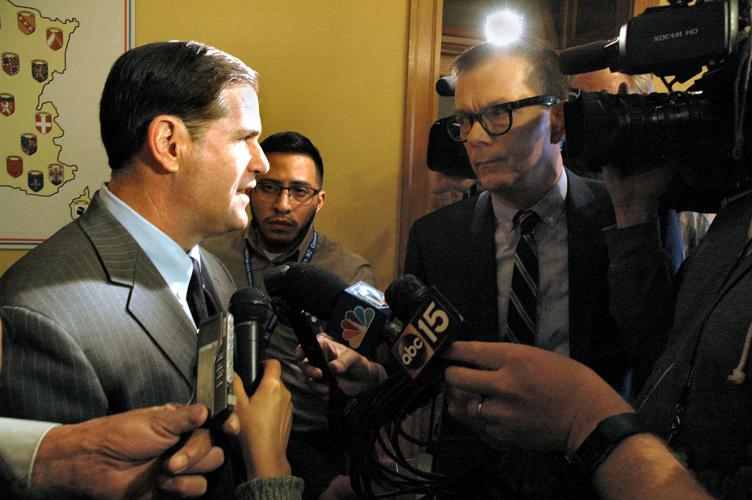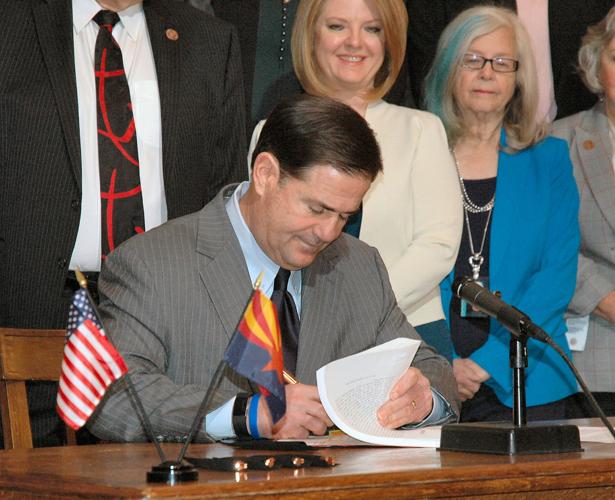PHOENIX — Saying there is an opioid-abuse crisis, Gov. Doug Ducey defended demanding that lawmakers review and adopt multiple changes in Arizona drug laws in just three days.
The comments Friday, on the heels of the governor signing the measure, come less than 24 hours after state lawmakers gave the package unanimous approval despite what several said are serious concerns and misgivings. Several also questioned the need for the rush, given that key provisions — including limits on the amount of opioids doctors can prescribe — do not take effect for 11 months.
“We have confidence in this bill,” Ducey said.
“There was no rush. We’ve been working on this bill since September,” he said.
He said the deaths of more than 800 Arizonans between June and the beginning of this year of suspected opioid overdoses, more than 5,000 overdoses and more than 450 babies born addicted to opioids amount to a crisis.
“This bill is about people who are dying, people who are overdosing, people that are becoming addicted,” he said.
Most lawmakers, not involved in the drafting, saw the first version of the measure when it hit their desks Monday night.
“I am someone who believes in our process,” Ducey said. “So if we do need to come back and have changes, I’m right there and we have a sitting Legislature.”
One key provision of the measure limits initial prescriptions to no more than five days — of 14 days for post-surgical patients — with an absolute dosage of no more than 90 “morphine milligram equivalents” unless they fall into certain excepted categories like burn victims, cancer patients and those in hospice.
Doctors who say their patients need more must first get approval from a board-certified pain management specialist.
Lawmakers added language late Thursday allowing that consultation to be by phone. But Sen. Kimberly Yee, R-Phoenix, said she doubts that doctors will be willing to risk the liability for giving large dosages through a simple phone consult.
“You want to see that patient face to face,” she said, openly worrying about how long it might take to get an appointment.
A last-minute amendment does allow the patient’s doctor to exceed the 90 morphine milligram equivalents (MME) if a specialist is not available within 48 hours.
Even that left some lawmakers unsatisfied.
“Here is a doctor who’s practiced for years, knows that patient, and now they have to get a second opinion,” complained Sen. Sylvia Allen, R-Snowflake.
Others questioned whether putting new requirements on “good” doctors will impair those who are less careful about the prescriptions they write.
Some lawmakers said there are unanswered questions about the software cost and availability for doctors, who will have to comply with a new requirement that all prescriptions be transmitted electronically to pharmacies rather than on paper.
Ducey again defended the plan. “We think this is the right package, that it’s thorough, thoughtful, aggressive, more so than any other legislation that’s been introduced at the Capitol for years,” the governor said.
House Speaker J.D. Mesnard said the plan recognizes that opioid addiction is different than being hooked on other drugs, especially in that most never intended to get addicted.
“They went to the ER, they went to the doctor, dealing with an issue,” he told colleagues during Thursday night’s vote. He said they get a prescription, go home, use it, “and suddenly there’s an addiction.”
Mesnard said he understands the problem on a personal level, detailing having to go to the emergency room last year for a “lower back issue I’ll probably be dealing with for the rest of my life.”
The doctor gave him a prescription for opioids, telling him to take one or two.
“I took one, didn’t really feel anything,” Mesnard said. “Took two, I felt it. And I could definitely see why people become addicted.”
Ducey, after signing the bill, predicted it will result in a big reduction in opioid addiction.
“While we have an opioid epidemic issue today, I believe we’ll solve this, just like we’ve solved methamphetamine and crack cocaine,” he said.
Moments later, however, the governor denied he said the problems have been solved. “I didn’t say that,” he said. “I said we addressed those issues. They are not the epidemics that they were.”





